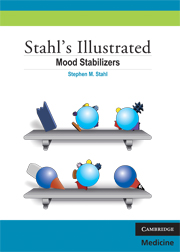Book contents
- Frontmatter
- Preface
- Contents
- CME Information
- Visual Vocabulary Legend
- Objectives
- Chapter 1 Symptoms and Spectrum of Bipolar Disorder
- Chapter 2 From Symptoms to Circuits
- Chapter 3 From Circuits to Mechanisms
- Chapter 4 Lithium and Various Anticonvulsants as Mood Stabilizers for Bipolar Disorder
- Chapter 5 Atypical Antipsychotics as Mood Stabilizers for Bipolar Disorder
- Chapter 6 Building a Treatment Plan
- Summary
- Addendum
- Abbreviations
- Suggested Readings
- Index
- CME: Posttest and Certificate
CME Information
Published online by Cambridge University Press: 22 October 2021
- Frontmatter
- Preface
- Contents
- CME Information
- Visual Vocabulary Legend
- Objectives
- Chapter 1 Symptoms and Spectrum of Bipolar Disorder
- Chapter 2 From Symptoms to Circuits
- Chapter 3 From Circuits to Mechanisms
- Chapter 4 Lithium and Various Anticonvulsants as Mood Stabilizers for Bipolar Disorder
- Chapter 5 Atypical Antipsychotics as Mood Stabilizers for Bipolar Disorder
- Chapter 6 Building a Treatment Plan
- Summary
- Addendum
- Abbreviations
- Suggested Readings
- Index
- CME: Posttest and Certificate
Summary
Overview
This minibook presents the symptoms, circuits, and pharmacologies relevant to bipolar disorders. It is divided into six chapters for easy browsing. Chapter 1 covers the symptoms of bipolar disorder and the spectrum from which this disorder presents. Chapter 2 introduces the brain circuits involved in depression and mania including the localization of aberrant neurotransmission involved in each symptom. Chapter 3 takes a closer look at the neurobiology of mania and depression, matching symptoms to malfunctioning mechanisms with a focus on ions, receptors and channels that correspond to the circuits illustrated in Chapter 2. Chapter 4 introduces lithium and various anticonvulsants as mood stabilizers for bipolar disorder, as well as their dosing strategies, side effect profiles, and drug-drug interactions that warrant caution. Chapter 5 provides an in-depth presentation of pharmacologic mechanisms of eight different mood stabilizers from the atypical antipsychotic drug class, as well as their dosing strategies, side effect profiles, and drug-drug interactions that warrant caution. Chapter 6 synthesizes knowledge from the previous five chapters to discuss individualized treatment plans, including rational use of polypharmacy and some alternative and supplementary treatments.
Target Audience
This CME activity has been developed for prescribers specializing in psychiatry. There are no prerequisites. All other health care providers interested in psychopharmacology are welcome for advanced study, especially primary care physicians, nurse practitioners, psychologists, and pharmacists.
Statement of Need
The following unmet needs and professional practice gaps regarding bipolar disorders were revealed following a vigorous assessment of activity feedback, expert faculty assessment, literature review, and through new medical knowledge:
• 30% of bipolar patients are misdiagnosed. Four key areas are important for discerning if a patient may have a bipolar spectrum disorder: sleep, treatment-response history, family history, talking to a relative. In addition, bipolar spectrum disorders are progressive illnesses, making diligent tracking of symptoms and treatment responses necessary.
• Physicians are not sufficiently informed of the evidence, treatment guidelines, and diagnostic criteria for ALL phases of bipolar illnesses, especially the mixed, maintenance, or depressed phases
• Because efficacy and tolerability of mood stabilizers, particularly atypical antipsychotic mood stabilizers, may vary depending on the phase of illness, treatment selection and dosing may need to be state-dependent in bipolar spectrum disorders
- Type
- Chapter
- Information
- Stahl's Illustrated Mood Stabilizers , pp. vii - xiiPublisher: Cambridge University PressPrint publication year: 2009



